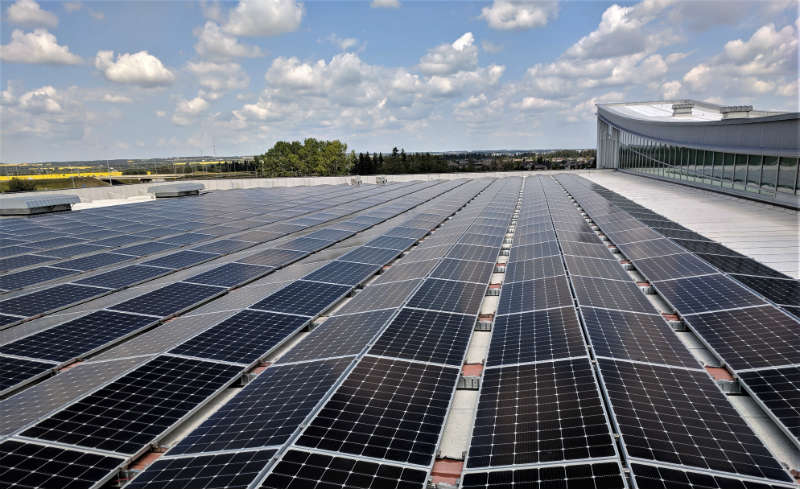Solar energy has emerged as a sustainable and eco-friendly alternative to traditional power sources. As more individuals and businesses seek to harness the power of the sun, the solar panel market has become increasingly competitive.
Among the many companies offering solar panels, Hyundai is a well-established name in the automotive industry and has extended its expertise to the realm of renewable energy.
In this article, we will provide a comprehensive review of Hyundai solar panels, exploring their features, performance, and overall value.
Background

Hyundai, a South Korean conglomerate, is renowned for its automotive manufacturing. However, the company’s commitment to environmental sustainability has led it to diversify into the solar energy sector.
Hyundai’s solar panels are designed to meet the demands of both residential and commercial applications. With a reputation for quality and reliability in the automotive sector, Hyundai’s foray into solar panels has been met with anticipation and curiosity.
Key Features

1. High Efficiency:
Hyundai’s solar panels are known for their high energy conversion efficiency, which allows them to generate more electricity from sunlight. This efficiency is achieved through advanced cell technology and efficient module design.
2. Durability:
Hyundai panels are built to withstand harsh weather conditions, such as hail, snow, and high winds. Their robust design ensures a long lifespan and minimal maintenance requirements.
3. Aesthetic Appeal:
Hyundai solar panels feature a sleek and modern design that seamlessly blends with a variety of architectural styles. This aesthetic appeal makes them an attractive choice for residential installations.
4. Warranty:
Hyundai offers a comprehensive warranty on their solar panels, providing peace of mind to consumers. The specific terms may vary depending on the model and location, but a standard warranty typically covers 25 years of performance guarantee and 10 years for product warranty.
Performance
The performance of Hyundai solar panels is commendable. Their high efficiency allows them to convert a significant portion of sunlight into electricity, resulting in improved energy generation.
Hyundai panels are known to maintain their efficiency over time, which is crucial for long-term solar investments. Additionally, their durability ensures they can withstand the test of time and continue producing power, even in challenging environmental conditions.
Hyundai offers a range of panel options with varying wattages, allowing customers to choose the most suitable panel for their specific energy needs. The company’s panels have been tested and certified by various international organizations to meet industry standards, ensuring reliability and performance.
Installation and Integration

Hyundai solar panels are designed for easy installation and integration into both residential and commercial settings.
Their sleek design and a variety of mounting options make them suitable for various roof types and configurations. However, it is recommended to hire a professional solar installer for a proper setup to maximize efficiency and ensure safety.
1. Choosing the Right Hyundai Solar Panels:
Hyundai offers a range of solar panels distinguished by their efficiency, durability, and performance. Before diving into the installation process, it’s crucial to choose the right panels that suit your energy needs and budget. Consider factors such as wattage, efficiency, and warranty to make an informed decision.
2. Site Assessment:
Conduct a thorough site assessment to determine the optimal location for installing Hyundai solar panels. Factors such as sunlight exposure, shading, and roof orientation play a vital role in maximizing energy production. Hyundai panels are designed to perform well in various conditions, but optimal placement ensures optimal results.
3. Installation Process:
The installation of Hyundai solar panels involves several key steps:
a. Roof Preparation:
Ensure that the roof is structurally sound and capable of supporting the weight of the solar panels. Roof integrity is crucial for the long-term stability of the installation.
b. Mounting Structure Installation:
Install the mounting structure, which serves as the foundation for the solar panels. The structure should be securely attached to the roof, providing a stable platform for the panels.
c. Panel Installation:
Attach the Hyundai solar panels to the mounting structure, following the manufacturer’s guidelines. Proper alignment and secure fastening are essential for the panels to withstand weather conditions and optimize energy capture.
d. Wiring and Inverter Installation:
Connect the panels with the inverter using the appropriate wiring. The inverter converts the DC (direct current) generated by the panels into AC (alternating current) suitable for household or grid use.
e. Electrical Connection:
Connect the inverter to the electrical system of the building, ensuring compliance with local electrical codes. This step may require the expertise of a licensed electrician.
4. Monitoring and Maintenance:
Hyundai solar panels are equipped with monitoring systems that allow users to track energy production and system performance. Regular maintenance, such as cleaning the panels and checking for any issues, ensures the longevity and efficiency of the solar power system.
5. Integrating with Smart Technologies:
Hyundai solar panels can be seamlessly integrated with smart home technologies, allowing users to monitor and control their energy consumption. Integration with energy storage solutions, such as batteries, enables the storage of excess energy for use during periods of low sunlight.
Financial Benefits
The installation of Hyundai solar panels brings about financial benefits. By harnessing solar power, users contribute to reducing carbon emissions and dependence on traditional energy sources. Additionally, many regions offer incentives, tax credits, and rebates for solar installations, making it a financially sound investment in the long run.
Environmental Impact
Hyundai, as a company, is committed to reducing its carbon footprint and promoting environmental sustainability.
This commitment extends to its solar panel production, which adheres to strict environmental standards and practices. By choosing Hyundai solar panels, customers are not only reducing their own carbon footprint but also supporting a company that actively works towards a greener future.
Conclusion
Hyundai’s foray into the solar panel industry has brought a reputable name and quality products into the renewable energy market. With high efficiency, durability, and an attractive design, Hyundai solar panels are a competitive choice for those considering solar energy for their homes or businesses.
The comprehensive warranties and commitment to environmental sustainability make Hyundai a reliable and responsible choice in the solar panel industry. However, as with any major investment, it’s essential for potential buyers to consult with local solar experts to determine the best fit for their specific needs and location.
Hyundai solar panels are poised to play a significant role in the global transition to clean energy and sustainable power generation.
